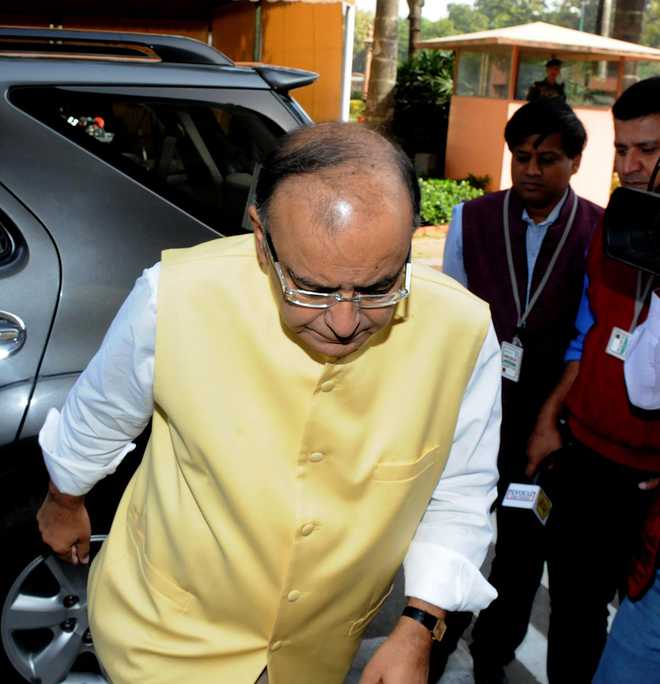
Finance Minister Arun Jaitley outside Parliament in New Delhi on Friday. Tribune photo: Mukesh Aggarwal
New Delhi, February 27
India's Economic Survey has projected growth at over 8 per cent for the next fiscal and said inflation was easing while setting the agenda for "big-bang" reforms to further drive expansion, prune wasteful expenditure and promote investments in a green way.
(See video: Economic Survey says GDP growth to top 8% in FY16)
Tabled in Parliament on Friday by Finance Minister Arun Jaitley and authored by a team led by Chief Economic Advisor Arvind Subramanian, the annual report card on the state of the economy said the growth should now rise further and double digit expansion was a possibility.
But it also had a caveat. "The growth estimates of over 8 percent for the year is on expectations that the monsoon will be favourable, as it was forecast to be normal, compared to last year," it said, adding that such an expansion was necessary to address poverty.
"Double-digit growth can help in 'wiping every tear from every eye' and realising the aspirations of India's youth," the survey said, indicating this should also be an easier task for the government now with a clear political mandate for reform and a benign external environment.
"Decisive shifts in policies controlled by the Centre combined with a persistent, encompassing, and creative incrementalism in other areas could cumulate to 'Big Bang' reforms." It said Gross Domestic Product (GDP) growth in 2012-13 was 5.1 percent, which increased to 6.9 percent in 2013-14 and was now expected to further increase to 7.4 percent in 2014-15, as per advance estimates available with the government.
On the intended green actions, the survey said while the shift from a carbon subsidisation regime to one of taxation and from negative pricing on emissions to putting an implicit positive price was welcome, there was still a long way to go on reform of coal and petroleum pricing.
On inflation, the survey said, there has been a fall of over 6 percentage points since 2013, even as the external sector, which includes exports and inflow of foreign funds, was returning to a path of strength and resilience. Industrial growth has also picked up now.
It also had some good news to report on the farm sector. "Foodgrain production for 2014-15 is estimated at 257.07 million tonnes and will exceed that of last year by 8.5 million tonnes." It also called for three incremental steps to create a national national market for farm produce: Removing fruits and vegetables from list of regulated goods, policy support from states to create alternative or special markets in private sector, and liberal policy for foreign investment.
The survey noted with concern the fall in productive investment in India in recent years. It said investment rate over the past years, as measured by gross capital formation (GCF) as a percentage of GDP declined from 38.2 percent in 2011-12 to 32.3 percent in 2013-14.
It also made a case for rationalisation of subsidies and said such doles did not appear to have had a transformative effect on the living standards of the poor. On the fiscal side, it said the government was committed to consolidation with revenue generation a priority.
The survey said a close look at price subsidies, which are estimated at around Rs.3,78,000 crore, or 4.24 percent of GDP, reveal that they may not be the government's best weapon for fighting poverty.
Importantly, it also observed that the current subsidy regime indicates that rich households benefited more from such doles than the poor. Among various examples it dwelt upon for this conclusion, it said that subsidy on electricity can only benefit the relatively rich.
At the same time, the survey said, eliminating or phasing out subsidies was "neither feasible nor desirable" and said the "JAM" trinity -- Jan Dhan Yojana, Aadhar cards and mobile phones -- will allow the government to deliver such doles in a targeted and less-distorted manner.
The survey also dwelt on Prime Minister Narendra Modi's pet project "Make in India" and said this key policy objective can be achieved by deciding what to make, giving priority to services and making some structural transformation in the skill sets of the labour force.
Equally important, it noted, was the removal of distortions that were preventing manufacturing to become an engine of economic growth, such as those in labour markets, capital markets, the land market and lack of sync between need for skilling and comparative advantage of labour force.
IANS



























